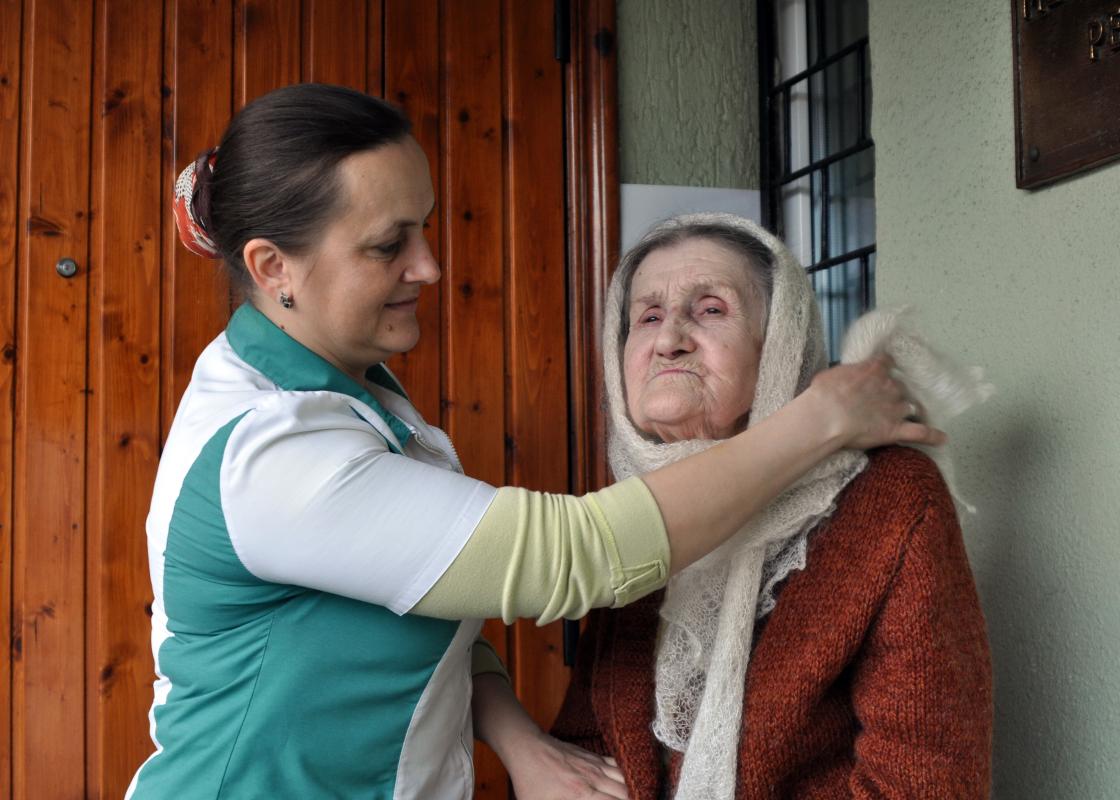The past few years have seen a major increase in female migrants from countries such as the Philippines, Russia, and Ukraine. They leave their home country in order to become house maids, nurses and child care workers in Western Europe. The women often leave due to financial necessity and unemployment, but this is not always the case.
The possibility for a better life abroad may be an equally important reason, but this fact is not talked about.
“There is a strong stigma connected to women who leave their country to work abroad. Male labour migrants do not experience this type of stigma,” says researcher at Fafo Guri Tyldum.
She has studied the female migration discourse in Ukraine. A lot of women travel from Ukraine to Italy to work as private nurses for elderly people.
When grandmother leaves
There have been plenty of front page news in Ukrainian newspapers about how society is unravelling due to absent mothers. The children go to the dogs, nobody looks after the elderly, marriages are ruined and the remaining men are driven to the drink.
“It is a general understanding that women who migrate sacrifice their own children. The discourse on female migration gives the impression that the women who migrate leave behind small children, but the average age of these women is forty plus. Quite a few are actually grandmothers,” says Tyldum.
Since Ukrainian women generally have children at an early age, the children are more or less grown up when their mothers leave for Italy. They are often gone for several years at a time, and they send money home.
“Does this mean that these women are being stigmatised for something that is unfounded?”
“It does. And this is also reflected in the research literature on the field. Nearly all research on female migrants who travel to Italy focus explicitly on the motherhood aspect.”
There are some women who leave their small children behind, but according to Tyldum, they are a small minority among the large stream of Ukrainian migrants. Moreover, there is a strong tradition in Ukraine for leaving the child care to the grandparents.
“Migration researchers’ view on female migrants is quite simply behind,” says Tyldum.
Fatherhood more important than motherhood
According to the researcher, motherhood is not an important factor for understanding the female migration stream to Italy, simply because the majority of the women who migrate have grown up children.

“Fatherhood, on the other hand, is central for understanding why Ukrainian men go abroad to work,” claims Tyldum.
She emphasises that the male Ukrainian migrants talk a lot about their responsibility as fathers and of the importance of being an attentive husband in the periods between the work orders.
“These men clearly identify with their role as a family man and provider. But within migration research, few scholars have paid any attention to the fatherhood aspect of male work migration.”
Ukrainian men usually go to Russia and Poland to work in the construction industry. Their work is often characterised by short-term contracts, and they commute between home and their jobs abroad.
Women are always perceived as mothers
“When it comes to female migrants, on the other hand, they are viewed in light of their identity as mothers regardless of whether this is of any relevance or not,” says Tyldum.
“Why do you think this is the case?”
“It might reflect the prevailing moral panic in countries characterised by large-scale female migration. But at the same time it is striking, since many female researchers fight the same battle themselves. They, too, fight for the freedom to be defined as something other than just mothers,” says Tyldum.
Researchers studying male labour migration seem to be more interested in the migrants’ opportunities and their access to the labour market than in what consequences migration might have for the family that is left behind in the home country.
Sacrifice themselves for the family
Tyldum is interested in the motifs the migrants make use of when they relate their own migration narratives.
On the one hand, female migration to Italy is regarded as a sacrifice. From this perspective, the women sacrifice themselves in order to create a better life for their families.
Tanya, a 53-year old woman who has returned to Ukraine relates:
“He [her husband] had not been working for fourteen years. Why did I go to Italy? Because I had to. There was no money. I was afraid … the future was uncertain. That’s the reason why I left for Italy.”
The women often talk about being away from their families for years at a time and the grief it involves. On top of that, their jobs are perceived as degrading and the working conditions are poor.
Motherhood is a central motif in the narrative of sacrifice. Motherhood forces the women to leave Ukraine. It is a mother’s duty to secure her children’s future and set her own needs aside even if it involves humiliation and poor working conditions in a foreign country.
Also a story of freedom
Some of the women, on the other hand, tell stories of freedom. They migrate because Italy offers a better life for them than Ukraine.
According to Natalie, aged 55, young women go to Italy to find a husband, while the older women go in order to get away from one:
“Young women go because it is interesting. Some older women go because they don’t have a husband here in Ukraine, while others go because he [their husband] drinks. That’s why they stay in Italy. An Italian husband won’t harm his wife. Women have more rights than men there.”
Better in Italy than in Ukraine?
According to Tyldum, it is important to understand what these women are running away from.
“After all, the working conditions are better in Italy than in Ukraine for many of these women,” she explains.
“In Ukraine they typically have a good-for-nothing husband and they have to run the family farm all by themselves. And in addition to their own family, they are often also responsible for their parents in law. On top of all this they often have one or two jobs outside the home.”
As one of Tyldum’s interviewees said: “You’re lucky if you have two hours of spare time on a Sunday in Ukraine.”
In Italy they’re off work every Thursday afternoon and all day on Sundays. And although they have to be available day and night during the rest of the week, after all they are only minding one elderly person, not an entire extended family.
Freedom and denunciation
One of Tyldum’s female interviewees had been living with and working for an elderly woman in Italy for six years, and they had become good friends. She lived in a nice house by the sea, she was responsible for the old woman’s finances, and her children and grandchildren were allowed to come visit. She felt that she was mastering her own life, and she was able to save up a lot of money.
However, this narrative of freedom was mixed with a narrative of sacrifice, of how she had made sacrifices for her family and how she was met with prejudices, denunciation and disrespect when she returned to Ukraine.
According to Tyldum, the women may avail of the narrative of freedom in order to describe their lives in Italy, but it is nevertheless not regarded as a legitimate reason for leaving in the first place.
“It won’t be legitimate to say “I left to pursue my own happiness” as long as there’s a general assumption that the women who migrate sacrifice their children.”
Not enough reasons to stay
Tyldum emphasises that the narrative of sacrifice is just as true as the narrative of freedom.
“Believing that Ukrainian women experience such hardship in their home country that they’re happy with the mere opportunity to work on the black market in the EU is a pitfall.”
“The female migrants are facing a black labour market where they are in danger of being exploited. Their employer may make an effort to have their work legalised, but it is often not in the employer’s interest, since it would increase the price of the services that these women can offer,” says Tyldum.
You need to keep at least two thoughts in your head simultaneously to really understand female labour migration from Ukraine.
“The story about migration as a way of gaining freedom illustrates that despite the economical profit, there’s a chance that some of these women would have remained at home if the reasons for staying with their family in Ukraine were better.”
Translated by Cathinka Dahl Hambro.
Read more about migration here: Gender and migration
Read more about au pairs in Norway
- Guri Tyldym is a sociologist and works at Fafo Institute for Labour and Social Research.
- Her article Motherhood, Agency and Sacrifice in Narrative on Female Migration for Care Work is a part of her PhD thesis on labour migration from Ukraine.
- The article was recently published in the journal Sociology, volume 1.2015.



